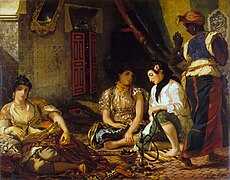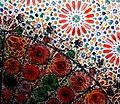Category:Orientalism
Jump to navigation
Jump to search
imitation or depiction of aspects of Middle Eastern and East Asian cultures | |||||
| Upload media | |||||
| Pronunciation audio | |||||
|---|---|---|---|---|---|
| Instance of |
| ||||
| Has part(s) | |||||
| Different from | |||||
| |||||

See also Category:Japonism and Category:Chinoiserie
- Orientalism as an artform was mainly developed during the XIXe in Western Europe. It sets the sight of European painters on the islamic civilisation, which is quite a subjective look. European society at that time restricted nude paintings for moral & religious reasons, so fantasizing about harems gave the artists freedom to act. Anecdoting scenes show European artists while on trip to Orient, that could only "let their imagination go on while waiting at the entrance of a Harem gate", literally meaning : restricted zone.
- Scientific orientalism was previous and mainly developed after the Age of Discovery as a way to enhance the colonization process of the World. Naturalists came back with awesome news. Describing old civilizations with new scientific ways and compiling knowledge about conquered remote lands gave the Europeans a strong feeling of superiority. Hence the basis of colonialism as an ideology. Egyptology can be traced back to orientalism: French and later English said they knew more about Egypt and Ancient Egypt than the dwelling populations there at that time.
"both consider the Orient as an object of studies". So that Occidental thinkers defined Occident itself, displaying what it was not while considering the rest of the world complied to their views.
Source: see Edward Said works on the subject.
Subcategories
This category has the following 21 subcategories, out of 21 total.
-
B
C
- Circassian beauty (16 F)
E
F
G
L
M
- Auguste Maure (15 F)
O
- Oriental Village (11 F)
- Overture Center for the Arts (29 F)
P
R
T
W
Z
Media in category "Orientalism"
The following 92 files are in this category, out of 92 total.
-
5496 Michel-V Paul durand (cropped).jpg 818 × 939; 554 KB
-
5496 Michel-V Paul durand.jpg 3,239 × 4,582; 10.41 MB
-
Actes du XIVe Congrès international des orientalistes, Alger, 1905, partie 1, 1906.djvu 4,267 × 6,570, 546 pages; 67.58 MB
-
Al-Afghani Co.png 496 × 720; 612 KB
-
Alexey Akindinov. Alerika-Gerika. 1997.jpg 2,999 × 4,000; 8.15 MB
-
Arredi al castello.jpg 3,382 × 2,919; 4.95 MB
-
Bazilije Stjepan Pandžić Zagreb 2011-06-24 (1).JPG 1,500 × 1,900; 2.49 MB
-
Bazilije Stjepan Pandžić Zagreb 2011-06-24 (cropped).JPG 1,626 × 1,908; 2.61 MB
-
Bazilije Stjepan Pandžić Zagreb 2011-06-24.JPG 2,000 × 2,923; 4.07 MB
-
Berliner Museum fuer Islamische Kunst als Forschungsinstitution.pdf 1,239 × 1,754, 126 pages; 619 KB
-
Beylerbeyi sırtlarından Istanbul Boğazı.tif 4,196 × 3,214; 38.62 MB
-
Bousbir in Qui ? le magazine de l'énigme et de l'aventure 6 November 1947.jpg 9,941 × 6,960; 10.68 MB
-
Breitschneider 1871.jpg 570 × 811; 76 KB
-
Carl Spitzweg Orientale Bleistiftzeichnung.jpg 732 × 1,200; 198 KB
-
Castello D'Albertis maioliche.jpg 2,560 × 1,920; 3.45 MB
-
Chambre.jpg 2,232 × 3,968; 4.24 MB
-
Christiaan Snouck Hurgronje - Mohammedanism (1916).djvu 1,000 × 1,500, 174 pages; 33.91 MB
-
Dancing Girl, Fabio Fabbi (1861-1946).webp 814 × 1,452; 614 KB
-
Dancing Girls 2, Fabio Fabbi (1861-1946).webp 1,058 × 1,357; 806 KB
-
Dancing Girls 4, Fabio Fabbi (1861-1946).webp 1,058 × 847; 162 KB
-
Dancing Girls, Fabio Fabbi (1861-1946).jpg 800 × 542; 183 KB
-
East of Tunesia (MacLeod, Kevin) (ISRC USUAN1100246).oga 1 min 42 s; 5.3 MB
-
El'AujehPalmer.jpg 2,048 × 1,180; 1.87 MB
-
Emile Boivin.png 220 × 268; 100 KB
-
Extracts and analysis of “Saqt az-Zand” in de Sacy’s “Chrestomathie Arabe”.jpg 1,293 × 1,041; 816 KB
-
François Nicot.png 365 × 605; 346 KB
-
Frederick Vezin - Ein Handel. Skizze, 1888.png 829 × 690; 1 MB
-
Ganesha Piedra.jpg 2,448 × 3,264; 2.58 MB
-
Georges Coudray.jpg 2,530 × 4,194; 5.03 MB
-
Giuseppe grandi, il beduino.jpg 1,072 × 2,696; 1.52 MB
-
Hedley's Oriental Green Ceylon Tea box.jpg 4,032 × 3,024; 1.87 MB
-
Ifagallery-logo.svg 229 × 70; 13 KB
-
Istanbul Boğazı’nın Tarabya’dan Karadeniz girişine kadar görünümü,.tif 4,512 × 3,197; 16.48 MB
-
J Pavlikevitch Stamboul 1916 v2.jpg 2,622 × 3,877; 2.21 MB
-
James Porter, Observations sur la religion les loix le, 1769.pdf 1,275 × 1,650; 92 KB
-
Lorientalisme au Musée des années 30 (Boulogne-Billancourt) (2135486215).jpg 1,024 × 868; 409 KB
-
Louis Comfort Tiffany (1848-1933). Walkway in Tangier.jpg 5,422 × 3,250; 10.7 MB
-
Maison de Saint-Rome.jpg 1,536 × 2,048; 916 KB
-
Vincent manago 1880-1936 femme preparant couscous algeria.jpg 2,880 × 2,280; 4.88 MB
-
Marvelous Scenic Railway, "Dragon Gorge" at Ocean Park, Cal. (pcard-print-pub-pc-51a).jpg 4,418 × 2,801; 3.22 MB
-
Maxenmoschee.jpg 800 × 600; 85 KB
-
MedivalResearches.jpg 800 × 1,358; 611 KB
-
Mongoloid skull.png 257 × 474; 77 KB
-
Nima fallahi (1).jpg 5,106 × 2,869; 4.46 MB
-
NubianWomen.webp 2,216 × 1,474; 964 KB
-
Opdracht kcv 054.jpg 3,456 × 2,304; 3.33 MB
-
Palermo- Young man in Arab costume in the cloister of Monreale (SM stf96).png 6,344 × 5,202; 78.9 MB
-
PalmerFrontPage1872.jpg 1,296 × 2,136; 1.27 MB
-
Plüschow, Wilhelm von (1852-1930) - n. 0550 - 10x15 cm Instagram.jpg 720 × 1,066; 400 KB
-
Rebuilt orientalist architecture (4694170891).jpg 4,332 × 2,927; 2.01 MB
-
RELAND Adriaan, La Religion des Mahométans, Illustration du titre.png 1,948 × 3,392; 659 KB
-
Restored buildings in downtown Beirut (4694801958).jpg 4,416 × 3,312; 2.68 MB
-
Saraceni Hagareni et Mauri Georg Jacob Kehr.png 425 × 628; 21 KB
-
Scene from "The Post Office" by Tagore at the Toronto Arts and Letters Club (I0014574).jpg 4,366 × 3,195; 5.54 MB
-
Scene from "The Post Office" by Tagore at the Toronto Arts and Letters Club (I0014575).jpg 4,275 × 3,145; 5.93 MB
-
Scene from "The Post Office" by Tagore at the Toronto Arts and Letters Club (I0014576).jpg 4,282 × 3,141; 6.05 MB
-
Scene from "The Post Office" by Tagore at the Toronto Arts and Letters Club (I0014577).jpg 1,382 × 3,304; 1.92 MB
-
Scene from "The Post Office" by Tagore at the Toronto Arts and Letters Club (I0014578).jpg 3,076 × 4,422; 5.64 MB
-
Scene from "The Post Office" by Tagore at the Toronto Arts and Letters Club (I0014580).jpg 3,027 × 4,494; 5.82 MB
-
Scene from "The Post Office" by Tagore at the Toronto Arts and Letters Club (I0014581).jpg 2,282 × 2,016; 2.27 MB
-
Scene from "The Post Office" by Tagore at the Toronto Arts and Letters Club (I0014582).jpg 4,318 × 3,157; 6.08 MB
-
Scene from "The Post Office" by Tagore at the Toronto Arts and Letters Club (I0014583).jpg 2,400 × 1,909; 2.18 MB
-
Scene from "The Post Office" by Tagore at the Toronto Arts and Letters Club (I0014584).jpg 4,361 × 3,123; 5.91 MB
-
Scene from "The Post Office" by Tagore at the Toronto Arts and Letters Club (I0014585).jpg 1,953 × 2,389; 2.81 MB
-
Scene from "The Post Office" by Tagore at the Toronto Arts and Letters Club (I0014586).jpg 3,106 × 4,422; 6.38 MB
-
Scene from "The Post Office" by Tagore at the Toronto Arts and Letters Club (I0014587).jpg 3,099 × 4,329; 5.72 MB
-
Scene from "The Post Office" by Tagore at the Toronto Arts and Letters Club (I0014590).jpg 3,129 × 4,374; 6.19 MB
-
Simple paisley.svg 274 × 341; 3 KB
-
Slave girl is sold on slave market, Fabio Fabbi (1861-1946) (cropped).png 2,361 × 3,115; 16.04 MB
-
Slave girl is sold on slave market, Fabio Fabbi (1861-1946) (cropped2).png 1,597 × 2,403; 8.83 MB
-
Slave girl is sold on slave market, Fabio Fabbi (1861-1946).png 2,803 × 4,039; 29.26 MB
-
Slave girl is sold on slave market, Fabio Fabbi (1861-1946).webp 1,058 × 1,524; 294 KB
-
Symbols of Oriental faiths.jpg 2,160 × 2,160; 402 KB
-
ThomasMcIlvaineArabianNights'MembranophonePlayerFrontispieceIllustration.jpg 983 × 1,500; 109 KB
-
Vernet Chasse au sanglier 77.986.0.140 mb.jpg 1,669 × 1,172; 307 KB
-
Vernet Scène berbère, campement 77.986.0.138 mb.jpg 2,141 × 1,532; 682 KB
-
View if North África at Dawn.jpg 1,800 × 1,186; 1.22 MB
-
Zakład Islamu Europejskiego - logo.gif 258 × 524; 29 KB
-
Émile-Auguste Reiber Album dessin mb.jpg 3,430 × 2,392; 853 KB
-
Особняк підрядника Бахмацького PIC 0879.JPG 2,560 × 1,920; 1.5 MB

.jpg/83px-2016_CSK_11800_0158_000(gustave_clarence_rodolphe_boulanger_a_water_carrier_at_the_harem_entra093734).jpg)
.jpg/104px-5496_Michel-V_Paul_durand_(cropped).jpg)

.jpg/120px-Acid_Arab_-_Less_Playboy_is_More_Cowboy_5%2C_Le_Confort_Moderne%2C_Poitiers_(2014-05-28_23.58.19_by_Xi_WEG).jpg)




.JPG/95px-Bazilije_Stjepan_Pandžić_Zagreb_2011-06-24_(1).JPG)
.JPG/102px-Bazilije_Stjepan_Pandžić_Zagreb_2011-06-24_(cropped).JPG)








.djvu/page1-80px-Christiaan_Snouck_Hurgronje_-_Mohammedanism_(1916).djvu.jpg)
.webp/67px-Dancing_Girl%2C_Fabio_Fabbi_(1861-1946).webp.png)
.webp/93px-Dancing_Girls_2%2C_Fabio_Fabbi_(1861-1946).webp.png)
.webp/120px-Dancing_Girls_4%2C_Fabio_Fabbi_(1861-1946).webp.png)
.jpg/120px-Dancing_Girls%2C_Fabio_Fabbi_(1861-1946).jpg)








_-_n._2703_recto_-_Tripolitana_-_Levy_Collection_-_Millon_auctions.jpg/88px-Gloeden%2C_Wilhelm_von_(1856-1931)_-_n._2703_recto_-_Tripolitana_-_Levy_Collection_-_Millon_auctions.jpg)
_-_n._G_0134_recto_-_Chiostro_di_Morreale_a_Palermo.jpg/120px-Gloeden%2C_Wilhelm_von_(1856-1931)_-_n._G_0134_recto_-_Chiostro_di_Morreale_a_Palermo.jpg)
_-_n._G_0137_-_Chiostro_San_Giovanni_degli_Eremiti_a_Palermo_-_da_-_Amore_ed_arte%2C_pp._140-141.jpg/87px-Gloeden%2C_Wilhelm_von_(1856-1931)_-_n._G_0137_-_Chiostro_San_Giovanni_degli_Eremiti_a_Palermo_-_da_-_Amore_ed_arte%2C_pp._140-141.jpg)
_-_n._G_0140_recto_-_Palermo_-_Cm_28_x_36_-_Aste_la_Rosa_-_Firmata_e_datata_1-2-06.jpg/95px-Gloeden%2C_Wilhelm_von_(1856-1931)_-_n._G_0140_recto_-_Palermo_-_Cm_28_x_36_-_Aste_la_Rosa_-_Firmata_e_datata_1-2-06.jpg)
_-_n._G_0161_recto_-_Giardino_-_timbrato_-_Cm_30x40_-_19-1-13.jpg/83px-Gloeden%2C_Wilhelm_von_(1856-1931)_-_n._G_0161_recto_-_Giardino_-_timbrato_-_Cm_30x40_-_19-1-13.jpg)




_(2135486215).jpg/120px-Lorientalisme_au_Musée_des_années_30_(Boulogne-Billancourt)_(2135486215).jpg)
._Walkway_in_Tangier.jpg/120px-Louis_Comfort_Tiffany_(1848-1933)._Walkway_in_Tangier.jpg)


.jpg/120px-Marvelous_Scenic_Railway%2C_%22Dragon_Gorge%22_at_Ocean_Park%2C_Cal._(pcard-print-pub-pc-51a).jpg)



.jpg/120px-Nima_fallahi_(1).jpg)


.png/120px-Palermo-_Young_man_in_Arab_costume_in_the_cloister_of_Monreale_(SM_stf96).png)

_-_n._0550_-_10x15_cm_Instagram.jpg/81px-Plüschow%2C_Wilhelm_von_(1852-1930)_-_n._0550_-_10x15_cm_Instagram.jpg)
_-_n._1096_-_Two_turbaned_boys_sitting_and_standing_beneath_palm_trees.jpg/83px-Plüschow%2C_Wilhelm_von_(1852-1930)_-_n._1096_-_Two_turbaned_boys_sitting_and_standing_beneath_palm_trees.jpg)
.jpg/120px-Rebuilt_orientalist_architecture_(4694170891).jpg)

.jpg/120px-Restored_buildings_in_downtown_Beirut_(4694801958).jpg)
.jpg/86px-Ruth_St._Denis_and_Ted_Shawn_in_an_out-of-doors_photograph._(3110869576).jpg)
.jpg/120px-Ruth_St._Denis_and_Ted_Shawn_out-of-doors_in_costume._(3110869672).jpg)

.jpg/120px-Scene_from_%22The_Post_Office%22_by_Tagore_at_the_Toronto_Arts_and_Letters_Club_(I0014574).jpg)
.jpg/120px-Scene_from_%22The_Post_Office%22_by_Tagore_at_the_Toronto_Arts_and_Letters_Club_(I0014575).jpg)
.jpg/120px-Scene_from_%22The_Post_Office%22_by_Tagore_at_the_Toronto_Arts_and_Letters_Club_(I0014576).jpg)
.jpg/50px-Scene_from_%22The_Post_Office%22_by_Tagore_at_the_Toronto_Arts_and_Letters_Club_(I0014577).jpg)
.jpg/83px-Scene_from_%22The_Post_Office%22_by_Tagore_at_the_Toronto_Arts_and_Letters_Club_(I0014578).jpg)
.jpg/85px-Scene_from_%22The_Post_Office%22_by_Tagore_at_the_Toronto_Arts_and_Letters_Club_(I0014579).jpg)
.jpg/81px-Scene_from_%22The_Post_Office%22_by_Tagore_at_the_Toronto_Arts_and_Letters_Club_(I0014580).jpg)
.jpg/120px-Scene_from_%22The_Post_Office%22_by_Tagore_at_the_Toronto_Arts_and_Letters_Club_(I0014581).jpg)
.jpg/120px-Scene_from_%22The_Post_Office%22_by_Tagore_at_the_Toronto_Arts_and_Letters_Club_(I0014582).jpg)
.jpg/120px-Scene_from_%22The_Post_Office%22_by_Tagore_at_the_Toronto_Arts_and_Letters_Club_(I0014583).jpg)
.jpg/120px-Scene_from_%22The_Post_Office%22_by_Tagore_at_the_Toronto_Arts_and_Letters_Club_(I0014584).jpg)
.jpg/98px-Scene_from_%22The_Post_Office%22_by_Tagore_at_the_Toronto_Arts_and_Letters_Club_(I0014585).jpg)
.jpg/84px-Scene_from_%22The_Post_Office%22_by_Tagore_at_the_Toronto_Arts_and_Letters_Club_(I0014586).jpg)
.jpg/86px-Scene_from_%22The_Post_Office%22_by_Tagore_at_the_Toronto_Arts_and_Letters_Club_(I0014587).jpg)
.jpg/86px-Scene_from_%22The_Post_Office%22_by_Tagore_at_the_Toronto_Arts_and_Letters_Club_(I0014590).jpg)

_(cropped).png/91px-Slave_girl_is_sold_on_slave_market%2C_Fabio_Fabbi_(1861-1946)_(cropped).png)
_(cropped2).png/80px-Slave_girl_is_sold_on_slave_market%2C_Fabio_Fabbi_(1861-1946)_(cropped2).png)
.png/83px-Slave_girl_is_sold_on_slave_market%2C_Fabio_Fabbi_(1861-1946).png)
.webp/83px-Slave_girl_is_sold_on_slave_market%2C_Fabio_Fabbi_(1861-1946).webp.png)







